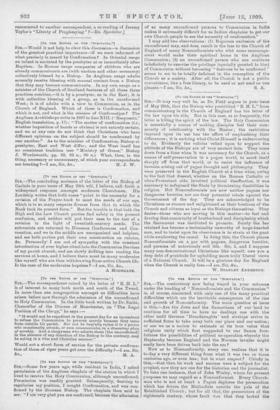[TO TRH EDITOR OF THE "SP ecrrArcm."] Snt,—Would it not
help to clear this discussion—a discussion of the greatest practical importance—if we were informed of what precisely is meant by Confirmation? In Oriental usage an infant is anointed by the presbyter at or immediately after Baptism. In Roman usage companies of children who are already communicants are (with unction and other ceremony) collectively blessed by a Bishop. In Anglican usage adults severally receive blessing with manual contact from a Bishop that they may become communicants. In my own usage as a minister of the Church of Scotland features of all these three practices combine,—it is by a presbyter, as in the East; it is with collective blessing of a group, as in the unreformed West; it is of adults with a view to Communion, as in the Church of England. Which of these is Confirmation, and which is not, and what is the essence of Confirmation P The Anglican Archbishops write in 1897 to Leo XIII. (" Responsio," English translation, p. 17): "Time matter of confirmation (i.e., whether imposition of hands or chrism) is not entirely certain, and we at any rate do not think that Christians who have different opinions on the subject should be condemned by one another." As to the minister of Confirmation, Bishop or presbyter, East and West differ; and the West itself has no consistent tradition (see "Ministry of Grace," Bishop J. Wordsworth, pp. 59, 82 n., 90 n.) What, then, is the thing, necessary or unnecessary, of which your correspondents










































 Previous page
Previous page